
- •In British English you
- •In American English always use
- •Slang & Idiomatic Expressions:
- •I love you
- •V acations & camping
- •About my family:
- •Helpful Vocabulary:
- •Related Phrases
- •Family-related Jokes
- •Indefinite Articles ‘a’ & ‘an’ (Determiners) – Неозначені Артиклі
- •D efinite Article ‘the’ – Означений Артикль
- •This is a family. The family is of five members
- •Zero/No Article – Family is very important in our life. Відсутність Артиклю
ancestor – предок
descendant – нащадок
family bonds – сімейні зв’язки/узи
relative – родич/родичка close relative – близький родич distant relative – далекий родич to be related to – бути родичами з kin – родичі, рідня, походження (form) lineage – родовід/походження/рід sibling – рідний брат/сестра (form) pedigree – родовід, походження |
nuclear family – сім’я, яка складається з обох батьків та дітей one-parent family – неповна сім’я, в якій є лише один з батьків extended family – сім’я, що складається з багатьох родичів to marry/get married – одружуватися to be married (to) – бути одруженим |














marriage – шлюб civil marriage – цивільний шлюб engagement – заручини religious marriage – вінчання bride – наречена |
wedding – весілля marriage certificate – свідоцтво про шлюб fiancé – наречений fiancée – наречена bridegroom – наречений/жених |
marriage of convenience – шлюб по розрахунку sham marriage – фіктивний шлюб widow – вдовиця widower – вдівець heritage – спадщина spouse – чоловік/дружина spouses / (married) couple – подружжя orphan – сирота adopted child – всиновлена дитина illegitimate – незаконнонароджений stepfather – вітчим stepmother – мачуха stepson – пасинок stepdaughter – падчерка stepbrother – зведений брат stepsister – зведена сестра godson – хрещеник goddaughter – хрещениця grandson – онук grandmother – бабуся great-grandfather – прадід grandparents – дідусь і бабуся grandchildren – онуки |
divorce – розлучення to be divorced – бути розлученим divorcee – розлучений чоловік/жінка single – неодружений/неодружена bachelor – холостяк husband & wife – чоловік та дружина brother-in-law – зять (чоловік сестри); шурин (брат жінки); свояк (чоловік своячки); дівер (брат чоловіка) sister-in-law – невістка (дружина брата); зовиця (сестра чоловіка); своячка (сестра жінки) father-in-law – свекор (батько чоловіка); тесть (батько жінки) mother-in-law – теща (мати жінки); свекруха (мати чоловіка) twin – близнюк godfather – хрещений батько godmother – хрещена мати uncle - дядько aunt – тітка nephew – племінник/небіж niece – племінниця/небога cousin – двоюрідний брат/сестра |
can
use family with a singular or
plural verb:
The
family now
lives/live
in London. a
singular verb: The
family lives
in
California.

In British English you
In American English always use

Dad,
daddy, pop
are names you can call your father: Pop
& I went for a
walk
along the
beach.
Mummy
(Br)
/ Mommy
(Am)
is a name for your mother used especially by young children or when
you are talking to young children: Ben,
is your mommy
coming
to the Christmas concert?
Slang & Idiomatic Expressions:
How's the/your family? – Як ви поживаєте? / Як твоя сім’я? it runs in the/one’s family – це є спадковим/традицією в нашій сім’ї |
in
the family |
(in the) family circle – у сімейному колі
(all) in the family – (тримати/залишати щось) у сім‘ї; лише у сімейному колі |
|
family that prays together stays together (literary) – сім’я, що молиться разом, залишається кріпкою
They are courting (form) / They’re dating / They’re an item / They’re going out (inf) – вони зустрічаються
like one of the family – як член нашої сім’ї (говорячи не про родича)
He’s
like one of our family
|
my better half / my darling spouse (form) – моя дружина/половина
the other half / the missus (inf) – моя дружина
“He’s / She’s / They’re family” (inf) – Він/вона/вони – родина/”свої люди” (для підкреслення тісного зв’язку)
to be the head of the family – бути головою сім’ї
Chinese
head of
the
family |
to be in a/the family way (inf + old-fashioned) – бути вагітною
I received a ‘Dear John’ letter (form) / We broke up (inf) – Ми розійшлися, припинили стосунки
She wears trousers in the relationship / He’s under the thumb (inf) / He’s under the heel of hers (literary) – він в сім’ї у неї “під каблуком”
|
black sheep of the family – “паршива” вівця у сім’ї
He has a mistress / He is seeing another woman (form) – У нього є коханка
He’s having an affair / He’s got a bit on the side (inf) – У нього є хтось на стороні / коханка
She dumped me (inf) – Вона мене покинула/ Кинула
Like father, like son – який батько, такий і син |
****************************************************************************
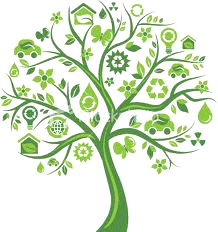

![]()

 It’s
quite natural
to wonder
where you
came from
and to
question who
your ancestors
might have
been. Our
ancestral
lineage
reaches back
through the
centuries and
possibly across
the seas
and over
continents. There
is no
doubt
that our
relatives
participated in
Women’s
Suffrage,
the World
Wars, and
even the
Industrial
Revolution. The
wonderful thing
about a
genealogical
search is
that it
can reveal
exactly what
part, if
any,
our families
played in
those historical
milestones.
Perhaps it
was a
major one,
perhaps a
minor role.
Whatever their
involvement, the
research we
undertake
will involve
us personally
in reliving
those eras
while discovering
new and
exciting facts
about our
family. But
just how
do we
begin this
epic adventure?
It’s
quite natural
to wonder
where you
came from
and to
question who
your ancestors
might have
been. Our
ancestral
lineage
reaches back
through the
centuries and
possibly across
the seas
and over
continents. There
is no
doubt
that our
relatives
participated in
Women’s
Suffrage,
the World
Wars, and
even the
Industrial
Revolution. The
wonderful thing
about a
genealogical
search is
that it
can reveal
exactly what
part, if
any,
our families
played in
those historical
milestones.
Perhaps it
was a
major one,
perhaps a
minor role.
Whatever their
involvement, the
research we
undertake
will involve
us personally
in reliving
those eras
while discovering
new and
exciting facts
about our
family. But
just how
do we
begin this
epic adventure?
Like any worthwhile and labour intensive exercise, getting started is the hardest part of a genealogical search. But it’s amazingly easy, and once you begin, the momentum you develop with the help of this manual will propel you onwards. The first step in beginning a family tree is to simply write down your name, your birth date and your place of birth on a sheet of paper. Voila, your genealogical search has begun! Wasn’t that easy? I told you so! It’s really that simple, but of course, it won’t always be. You’ve written down facts about yourself that are common knowledge and easy to come by. In doing so you have begun compiling your family history.
 Building
a
Family
Tree
and
Recording
a
Family
History is
NOT
the
Same
Thing. Though
the two
are
interdependent,
it’s
important to
know the
difference. While
you can’t
build a
family tree
without knowing
some family
history, certain
details are
not required
for the
family tree
to grow.
To establish
a family
tree, all
the information
you’ll
need are
the names
of the
family members
to be
included in
the tree,
their birth
dates and
places, death
dates and
places and
marriage dates
and places
if applicable.
This is
what you
see commonly
displayed in
“tree” form
and is
also known
as an
Ancestral or
Pedigree chart.
Building
a
Family
Tree
and
Recording
a
Family
History is
NOT
the
Same
Thing. Though
the two
are
interdependent,
it’s
important to
know the
difference. While
you can’t
build a
family tree
without knowing
some family
history, certain
details are
not required
for the
family tree
to grow.
To establish
a family
tree, all
the information
you’ll
need are
the names
of the
family members
to be
included in
the tree,
their birth
dates and
places, death
dates and
places and
marriage dates
and places
if applicable.
This is
what you
see commonly
displayed in
“tree” form
and is
also known
as an
Ancestral or
Pedigree chart.
Though the construction of the Family Tree is an important aspect of genealogy, researching and recording your family history is genealogy. In compiling your family history, you’re accumulating all the information you’ll need to develop your family tree. You’ll record all of this information in what is known as a family group record. This is your most important file in your genealogical search, and will contain all of the information you gather on every member of your family. Your family group record will be the basis of your genealogical search, and forming it is the best way to begin.
……………………………………………………………………………………………………..
A 1. Read & translate the text. 2. Answer the following questions:
************************************ B Find Ukrainian equivalents to the
1. ancestral lineage 2. no doubt 3. Women’s Suffrage 4. if any |
*********************************** C Match the words and their 
definitions:
|
||||||
6. boy 7. girl 8. close relative 9. distant relative 10. mother-in-law 11. sister-in-law 12. stepmother
|
d a young person from the time he/she is born until he/she is about 14 or 15 e the sister of your wife or husband f a family in which there is only one parent g someone’s mother and father h someone who is not closely |
related to you i male child j a family including cousins, grandparents etc k the mother of your wife or your husband l a female child |
|||||
D Create your own Family Tree & so your family history record:

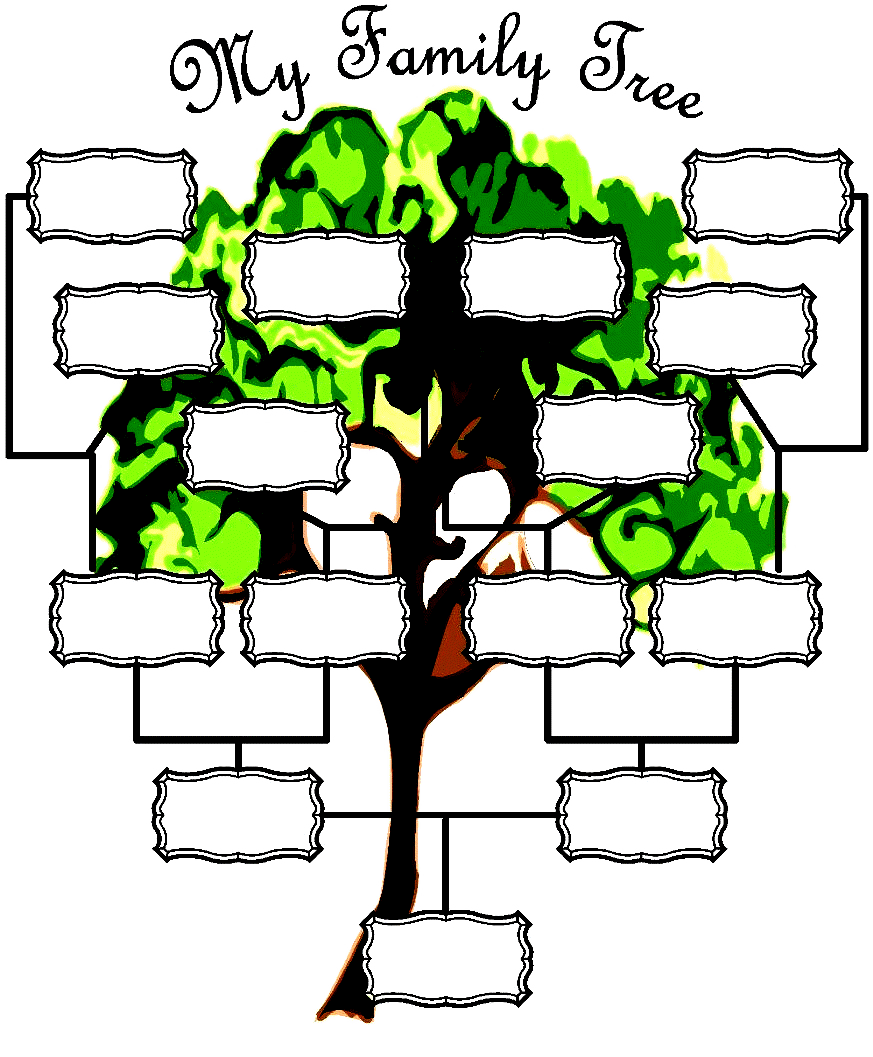
*************************************************************************

![]()
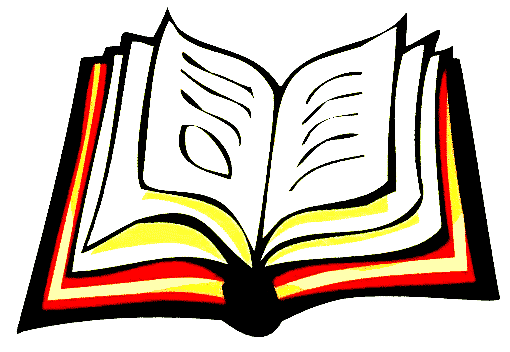
The English are a nation of stay-at-home. "There is no place like home," they say. And when the man is not working he is at home in the company of his wife and children and busies himself with the affairs of the home. "The Englishman's home is his castle," is a saying known all over the world. And it is true.
A "typical" British family used to consist of mother, father and two children, but in recent years there have been many changes in family life. Some of these have been caused by new laws and others are the result of changes in society. For example, since the law made it easier to get a divorce, the number of divorces has increased. In fact one marriage in every three now ends in divorce. This means that there are a lot of one-parent families. Society is now more tolerant than it used to be of unmarried people, unmarried couples and single parents.
A nother
change has
been caused
by the
fact that
people are
living longer
nowadays, and
many old
people live
alone following
the death
of their
partners. As
a result
of these
changes in
the pattern
of people's
lives, there
are many
households
which consist
of only
one person
or one
person and
children.
nother
change has
been caused
by the
fact that
people are
living longer
nowadays, and
many old
people live
alone following
the death
of their
partners. As
a result
of these
changes in
the pattern
of people's
lives, there
are many
households
which consist
of only
one person
or one
person and
children.
You might think that marriage and the family are not so popular as they once were. However, the majority of divorced people marry again, and they sometimes take responsibility for a second family.
Members of a family – grandparents, aunts, uncles, cousins – keep in touch, but they see less of each other than they used to. This is because people often move away from their home town to work, and so the family becomes scattered. Christmas is the traditional season for reunions. Although the family group is smaller nowadays than it used to be, relatives often travel many miles in order to spend the holiday together.
In general, each generation is keen to become independent of parents in establishing its own family unit, and this fact can lead to social as well as geographical differences within the larger family group.

Relationships within the family are different now. Parents treat their children more as equals than they used to, and children have more freedom to make their own decisions. The father is more involved with bringing up children, often because the mother goes out to work. Increased leisure facilities and more money mean that there are greater opportunities outside the home. Although the family holiday is still an important part of family life (usually taken in August, and often abroad) many children have holidays away from their parents, often with a school party or other organized group.
Who looks after the older generation? There are about 10 million old-age pensioners in Britain, of whom about 750,000 cannot live entirely independently. The government gives financial help in the form of a pension but in the future it will be more and more difficult for the nation economy to support the increasing number of elderly. At the present time, more than half of all old people are looked after at home. Many others live in Old Peoples' Homes, which may be private or state owned.
.....................................................................................................................................
1. A 1. Read & translate the text. 2. Answer the following questions:
*********************************** B Find the synonyms of these words in
t 1) homebody 6) answerability 2) family 7) education 3) wishful 8) so that 4) completely 9) get along with 5) abiding 10) separated |
11) to maintain contact 12) example ************************************ C Match the words:
************************************ D Check up your memory. Fill in the text with the English equivalents of the Ukrainian words:
A “typical” британська ….. сім’я ..… складається ….. of a матері .…, a батька ……. and two дітей ……., but in recent years |
there have been many changes у сімейному житті …….. For example, since the law made it easier to розлучатися ……, the кількість …… of розлучень …… has increased. In fact, one одруження …… in three now ends in divorce. This means that there are a lot of one-parent сімей …….
Члени родини ……… – дідусі і бабусі ……, тітки ……, дядьки ……, двоюрідні брати та сестри …… – keep in touch, but they see less of each other than they used to. This is because people often від’їжджають …… from their home town to work.
Відносини …… within the family are інші ….. now. Parents виховують дітей ………….. more as equals than they used to, and діти …… have more freedom to вирішувати ……. But still, the English are a нація …… of stay-at-homes. “Ніде так не гарно як вдома ………………..”, they say. And when the man is not working he is at home in the company of his дружини …… and дітей ……. and busies himself with the affairs of the home. “Мій дім – моя фортеця ……………..”, is a saying known all over the world. And it is true.
***************************************************************************

![]()

It is so important to have traditions. They are part of the glue that holds families together. Traditions are beneficial in several ways. First, they give children and even teens a sense of security. They know that in an uncertain world, some things stay the same. Traditions also foster closeness in the immediate and extended family. Lasting memories are
formed, and hopefully our children will continue the customs in their own homes and make more of their own. Here are some suggestions for creating some family traditions. None are hard to do. These have worked over the years for our family:
S
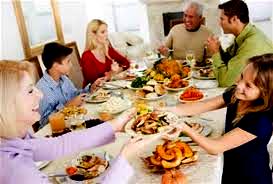 UNDAY
DINNER
UNDAY
DINNER
We started this when my first son was a baby. My mother, sister and brother-in-law, my husband, sons, and I get together for a carry-in dinner every Sunday. We take turns hosting the dinner at our houses. Whoever makes the main dish has the dinner at their house. After my dad died, this was especially meaningful to my mother. It gives us all something for which to look forward.
F
 RIDAY
NIGHT
MOVIE
&
PIZZA
RIDAY
NIGHT
MOVIE
&
PIZZA
E
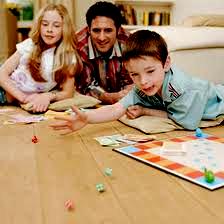 very
Friday night
my family
and my
husband's brother
get together
for a
movie. Usually
we have
pizza for
supper on
Friday because
it is
the end
of a
tiring work
week. I
can either
throw one
in the
oven or
call in
one to
be delivered.
We have
watched some
really good
movies and
some we
tried were
not as
good as
they were
advertised to
be. However,
we get
a
kick
out
of my
86 year
old mother
watching these
wild action
movies that
all the
guys like!
She's interested,
too!.
very
Friday night
my family
and my
husband's brother
get together
for a
movie. Usually
we have
pizza for
supper on
Friday because
it is
the end
of a
tiring work
week. I
can either
throw one
in the
oven or
call in
one to
be delivered.
We have
watched some
really good
movies and
some we
tried were
not as
good as
they were
advertised to
be. However,
we get
a
kick
out
of my
86 year
old mother
watching these
wild action
movies that
all the
guys like!
She's interested,
too!.
GAME NIGHT
This is one thing that we tried to do when the boys were younger. It was a little harder to keep up with, because of extra-curricular activities and homework. It is nice to set aside one evening of the week, maybe Wednesday, and have everyone sit at the kitchen table and play board games.
R
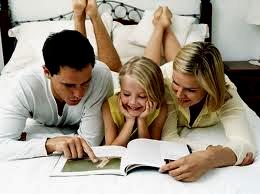 EADING
TOGETHER
EADING
TOGETHER
B
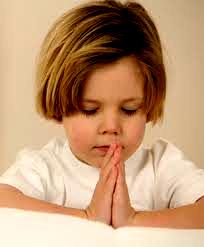 eing
a teacher,
I have
read to
my children
since they
were just
a few
months old.
My husband
and I
memorized Dr.
Seuss's "ABC"
book! Then
as the
boys got
older, we
got into
action books
and mysteries.
I enjoyed
them as
much as
the kids
did. It
was a
nice, calm
way to
end the
day and
get
settled
for bed.
eing
a teacher,
I have
read to
my children
since they
were just
a few
months old.
My husband
and I
memorized Dr.
Seuss's "ABC"
book! Then
as the
boys got
older, we
got into
action books
and mysteries.
I enjoyed
them as
much as
the kids
did. It
was a
nice, calm
way to
end the
day and
get
settled
for bed.
NIGHTLY DEVOTIONS & PRAYER
From the time the boys were young, I tried to establish the importance of regular Bible reading and prayer. When they were small, we read short Bible stories and had short prayers. Even now, as teens, we read the Bible and pray over any issues in their lives.




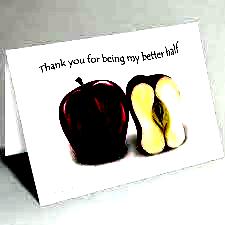
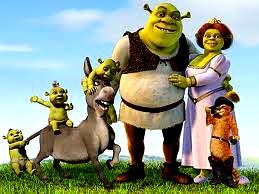

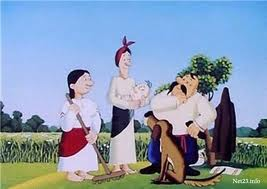


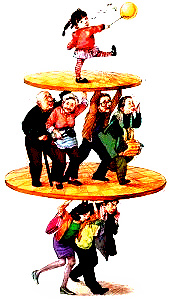



 following:
following:
 he
text:
he
text: